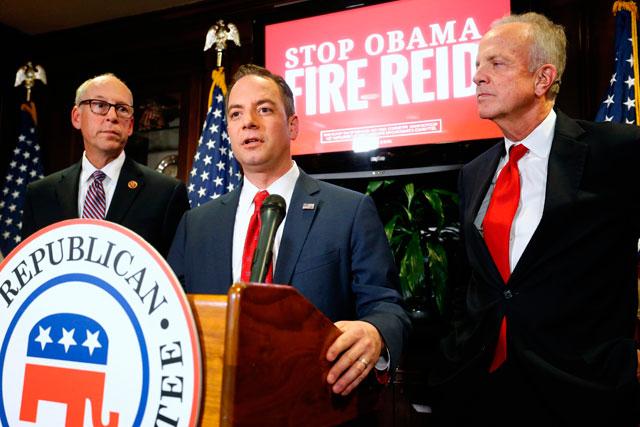You are here
Obama leaves UN a changed statesman
By AFP - Sep 25,2014 - Last updated at Sep 25,2014
WASHINGTON — Barack Obama leaves the annual United Nations meeting Wednesday with his presidency reshaped by a new era of global turbulence and his worldview sharpened by rampant jihadism's "heart of darkness”.
A year ago at the United Nations, with his authority and image as a statesman rocked by his eleventh hour decision to call off military strikes on Syria, Obama declared "the world is more stable than it was five years ago”.
Fast forward a turbulent 12 months, and that statement is remarkable as a historical marker of a world unready for a crush of breaking crises.
In his speech to the UN General Assembly on Wednesday, Obama offered a stark survey of a more dangerous and unpredictable globe.
"As we gather here, an outbreak of Ebola overwhelms public health systems in West Africa and threatens to move rapidly across borders," Obama told the hushed UN chamber.
"Russian aggression in Europe recalls the days when large nations trampled small ones in pursuit of territorial ambition.
"The brutality of terrorists in Syria and Iraq forces us to look into the heart of darkness."
Wednesday's speech was surely one Obama never contemplated a few years ago.
When he took office in 2008, his mission was to end wars that left the United States bloodied and exhausted.
Instead, he now finds himself launching a new conflict — against the Islamic State group — which the White House freely admits will stretch past his departure from office in January 2017.
Officials will have swallowed deeply at headlines which greeted Obama on Thursday, with multiple media outlets comparing the current president to George W. Bush, whose anti-terror policies he repudiated.
Many observers were struck by the echo between Obama's warning that the world must confront the jihadist "network of death" and Bush's "axis of evil" slogan grouping Iran, Iraq and North Korea.
The British weekly "The Economist" cheekily superimposed a picture of Obama's head over the body of Bush in the flight suit he wore when flying to a US aircraft carrier for infamous "Mission Accomplished" photo-op after the invasion of Iraq.
Jeremy Shapiro, a Brookings Institution analyst, said Obama remains a reluctant global warrior.
"The president is not all that happy that he has ended up at this place, he would prefer not to yet again be exercising US military power in the Middle East," Shapiro said.
"At the same time, the idea that the president was ever a naive idealist is simply contradicted by the facts."
Senior US officials argue that Obama's leadership of a global coalition to take on Islamic State and fellow extremist groups had important differences with Bush's approach.
In fact, Obama's prosecution of a war against IS using the might of US air assets and empowered allies on the ground — quickly refashioned Iraqi government and Kurdish forces for instance — is consciously designed as a departure from Bush's land invasion of Iraq.
Evil does exist
And for all the Republican criticism of Obama over a "feckless" foreign policy a clear line is evident between Wednesday's speech and his Nobel Prize acceptance lecture in Oslo in 2009.
To the surprise of many, when he showed up to collect a prize even he admitted was premature, Obama gave a speech not about how to forge peace — but a treatise on the need to sometimes wage war.
"I face the world as it is and cannot stand idle in the face of threats to the American people. For make no mistake: Evil does exist in the world," Obama said in his Nobel lecture.
Shapiro said that if Obama had ever been prone to show "naive idealism" the Nobel address would have been the place where it would have surfaced.
"But the speech [was] precisely the opposite. It says we have not eliminated war, we are not going to eliminate war and as American president I may have to exercise that."
There was also an important domestic political dimension to Obama's appearance before world leaders at the UN.
In recent weeks, the president's credibility as a global leader has been rattled by his own missteps, especially over his statement last month that he did not "yet" have a strategy to take on Islamic State.
Difficult period
A difficult period leading up to US air strikes on IS in Iraq and Syria has, according to polls, dented confidence in his leadership on national security — that as recently as the 2012 election was seen as an asset.
A majority of Americans support US air strikes and oppose the use of ground troops in Iraq and Syria — a seam of public sentiment to which Obama is now aligned.
But previous conflicts have shown that while the president could win from a patriotic surge with American troops at war, public support could fade quickly if success is not evident against IS in the medium term.
Related Articles
President Barack Obama faces the prospect of a turbulent final two years in office after Republicans stormed to power in the US Senate, extended their majority in the House of Representatives in a midterm election that was a clear repudiation of the president's leadership.
WASHINGTON — Build a wall, make nice with Moscow, tear up free trade deals and force Washington's allies to pay more for their own security.
MIAMI — Jeb Bush cast himself as a more moderate type of Republican while still holding on to his conservative principles as he began his US


















